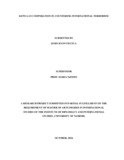| dc.description.abstract | Over the past two decades or so, acts of international and localized terrorism in Africa and elsewhere in the world have not only caused wanton human suffering but also constituted a direct threat to state survival. Terrorism continues to pose serious challenges to states in Africa and the world at large. Mutating and elusive repertoires around the vice have proven difficult to muster for many a government in the region. Yet while regional governments -either singly or collectively- have continued to enhance their counterterrorism strategies and capabilities; from time to time, serious qualms have emerged concerning the extent to which these processes have contravened and/or fell short of international human rights commitments and expectations upon the states. The United Nations General Assembly defines terrorism as a global security threat which requires collaborative approach. Kenya has witnessed several terrorist attacks ranging from the US Embassy bombing in 1998 to the recent Garissa University attacks. It is also worthwhile to mention that it is not only Kenya that has suffered from terrorism, but countries like Tanzania, Nigeria and Uganda have not been left behind. Terrorist groups including the al-Shabaab of Somalia, Boko Haram of Nigeria, Ansar Bayt Al-Maqdis (ABM) and the al-Qaida in the Islamic Maghreb (AQIM) not only tear into the social fabric of a society, but also radicalize and recruit youths to join their terror groups. These groups main aim is to denounce western ideologies and radicalize the youths against teachings which go with Islam. A collaborative approach is required to counter such groups. The study sought to examine the status of terrorist phenomenon globally and the various global partnerships which exist with a view to assessing their level of efficiency. The research site was Nairobi. The study found that found that lack of democracy, failed or weak states, the emergence of modernization heralded by high economic growth has equally been found to correlate strongly with the emergence of ideological terrorism, historical antecedents of political violence, civil wars, and extremist ideologies revolutions, dictatorships or occupation may lower the threshold for acceptance of political violence and terrorism, and impede the development of non-violent norms among all segments of society as some of the factors that have been sustaining terrorism in the world today. The study concludes global terrorism has been on the rise, as the respondents explained that last year, 2015, marked the biggest rise in deaths caused by terrorist attacks, with more than 32,000 people killed in by the attacks worldwide. Based on this finding the study recommends an expansion on cooperation between national and regional terrorism practitioners and centers outside the Kenya-US partnership and the Kenya-US counter terrorism partnership to working with restorative justice alternatives and organizations exploring methods of dealing with terrorists and radicals. | en_US |



